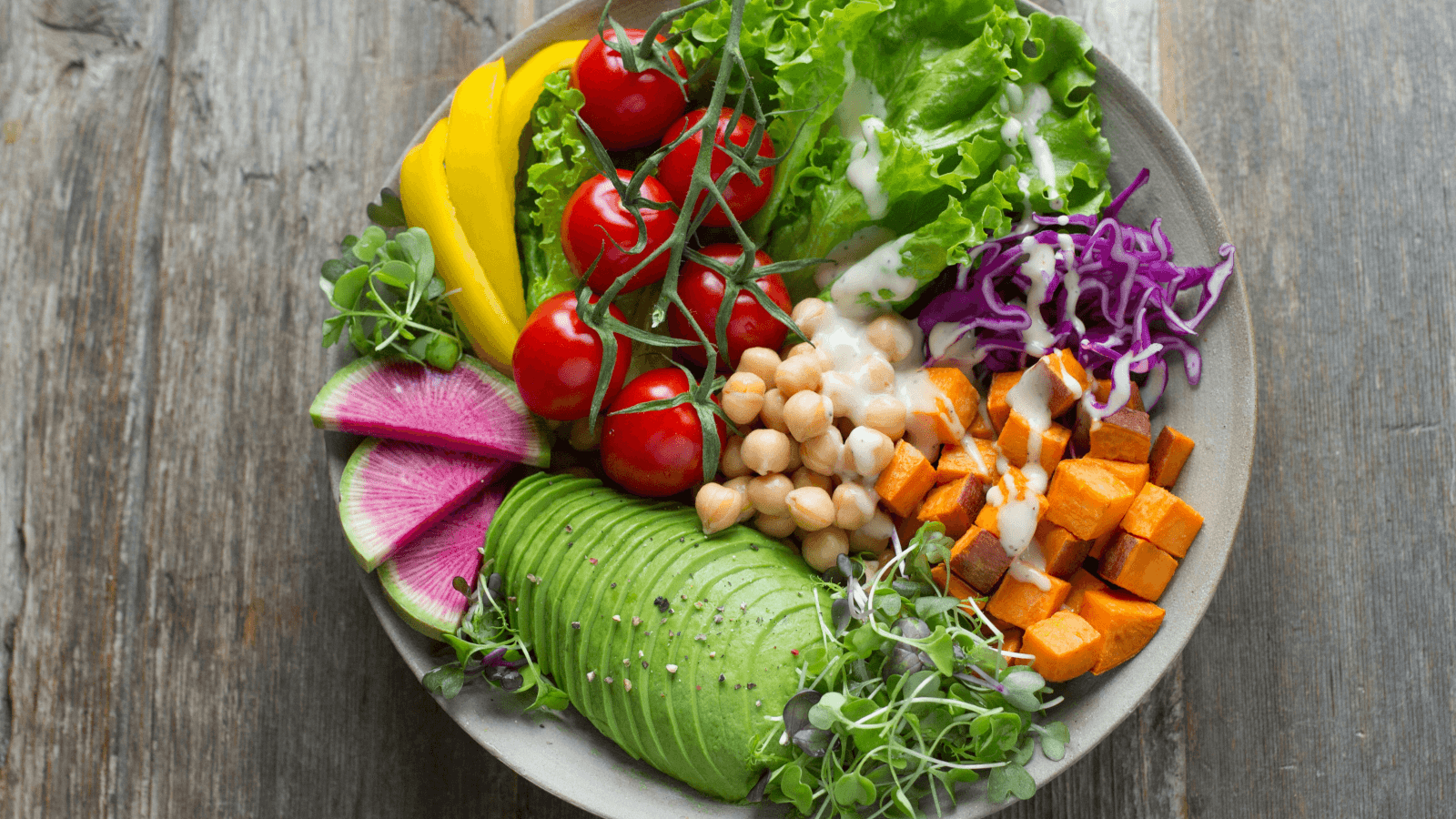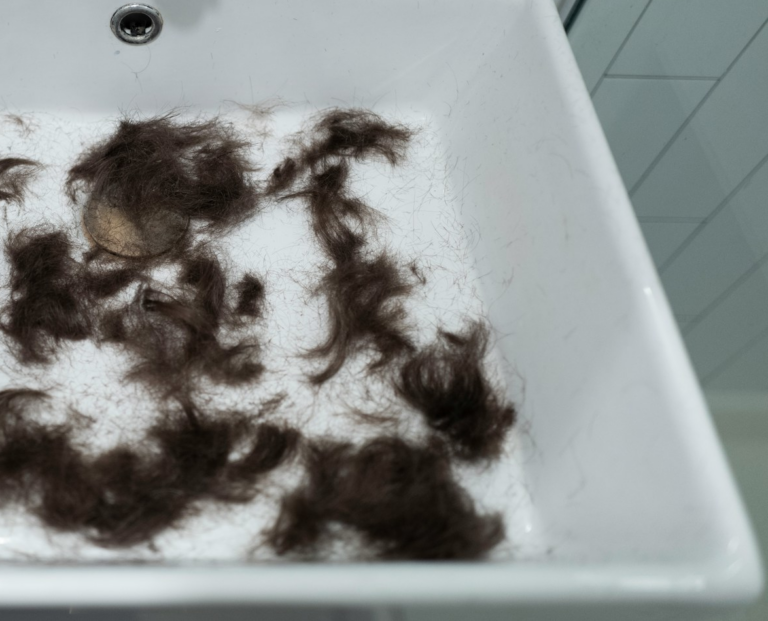If your goal is to eat for health and longevity, these tips might help. Please keep in mind that these directives are not dogmatic and not set in stone. They are, however, very contextual at times.
This is what you can do
Include more vegetables in your diet
This one is so well-known yet so underrated. Including more vegetables in your daily diet will provide you with a variety of important nutrients. Eating vegetables makes you more satiated. This will prevent overeating on less healthy foods. It’s the most effective thing you can do for positive changes in the long run.
Eat more cruciferous vegetables
Cruciferous vegetables, such as broccoli, cauliflower or brussel sprout have cancer-preventing properties and contain important vitamins and minerals. [1]
Always include greens, but…
Not all greens are created equal. While you can (and should) include kale in your daily diet, make sure you limit your weekly consumption of spinach and mangold. These greens contain high amounts of oxalic acid. This acid can lead to health problems, such as kidney stones. It can worsen your nutrient intake and can even be deadly in very high amounts.
Eat more fruits
Unless you’re fructose intolerant, make sure you eat at least 2 servings of fruit per day. Fruits provide you with important vitamins and secondary plant substances. Their anti-inflammatory properties can prevent certain diseases.
Eat berries every day
Berries are among the best foods you can include in your daily diet. To reap the benefits of variety, include blueberries, raspberries, blackberries and more. Berries are high in antioxidants, can lower cholesterol and blood pressure, improve brain function, may be protective against cancer and protect against diabetes. Blueberries have been shown to improve artery function after consumption. [2]
Add nuts and seeds
The body needs fat, so nuts and seeds are a great source of healthy fats. 3 Walnuts contain enough Omega-3 for the day and flaxseeds improve digestion. Brazil nuts contain selenium (important for vegans who don’t get it otherwise) and can lower cholesterol.
Limit cashew nuts and almonds, though. While they are a great source of magnesium, they also have a higher oxalic acid content.
Beans and legumes for protein
Even today, a lot of people still wonder where plant-based eaters get their protein from. Beans and lentils are great protein sources, contain fiber and have a positive effect on gut health.
Whole grains are a great staple
Unless you’re gluten-intolerant, include whole grains in your daily diet. Not only are they a great source of complex carbohydrates, which regulate blood sugar beneficially. They also contain important minerals and are satiating and tasty. [3]
Less meat and fish
Animal products such as meat and fish contribute to diseases like heart disease, stroke or cancer. Quality is of great importance. Most people won’t be able to afford the happy grass-fed organic beef that is probably less detrimental to your health than cheap meat that comes from factory farming and is full of antibiotics.
The oldest populations in the world sometimes eat small quantities of meat. So it’s a good idea to reduce meat and fish consumption, or cut it out completely.
Less dairy products
Dairy has similar carcinogenic effects and can also contribute to atherosclerosis, the clogging of arteries, which can lead to heart attacks and strokes. Yes, fat cheese is tasty and pizza tastes just amazing with it, but it’s nothing one should eat in excess. [4]
Less oil
You’ve probably heard that olive oil is healthy and part of the Mediterranean diet. Studies have shown that it actually leads to a decline of artery function after consumption. So the protective effects that are always contributed to olive oil are not because of the olive oil but despite it. In a Mediterranean diet, people consume lots of vegetables with olive oil, and those veggies have the protective effects. [5]
It’s no surprise that other cheap plant oils should be avoided, too. Heating oils turns them into trans fatty acids, which we talk about below.
Get your good fats from nuts, seeds and avocados and you’re good to go.
We need to talk about processed food
Reduce the amount of processed food you consume. It’s crucial to think differently about what you consider food. The food industry has led us to think that processed shit in plastic bags can be considered food. But it’s not. It’s crap and it’s making us sick.
Michael Pollan has a nice rule in his book “Food Rules”: Don’t eat anything your great-grandmother wouldn’t recognize as food.
Trans fats are the enemy
Reduce trans fats. That is almost every oil that has been heated. Cookies, chips, fries and all the other junk food that tastes amazing will inevitably hurt your arteries and make you sick in the long run. They cause atherosclerosis, heart attacks, strokes and cancer. [6]
Hidden calories or liquid sugar
Look out for hidden calories and reduce sugar, especially in beverages.
Artificial sweeteners are not your friend
The problem with artificial sweeteners (yes, even those in your favorite protein powder) is that they evoke the same insulin response in your body as sugar. Some of them, Sucralose for example, have been shown to cause cancer. They are not a free ticket to indulge in sweet taste.
Water and Tea for staying hydrated
Drink 3–4 liters of water daily, if you can. Coffee and alcohol don’t count. It has been said that coffee dehydrates you. Others claim it doesn’t. To be safe, don’t count coffee in and you should be good to go.
Drinking lots of water in a short period of time, like more than one liter per hour, can lead to excess loss of electrolytes with urine, so don’t overdo it. And drinking 6 liters at once can actually lead to death.
How do you react to coffee?
Coffee is humanity’s favorite drug. Some people don’t have a problem with it, but if you’re reacting sensitively to it, try to quit coffee completely. For some people, this cures their anxiety and improves sleep significantly.
Alcohol
New studies show that there’s no harmless amount of alcohol. Do you really need it? Are you a social drinker? Or is it a reward for you? Try to find out what fuels your alcohol habits and see if you can reduce or leave it out completely. It’s no shame to grab an alcohol-free beverage with your friends instead. [7]
Supplements: Only what’s necessary
Vitamin D, especially during winter, if you don’t live near the equator and don’t get a lot of sun exposure. If you live in a northern latitude, get around 15 minutes of daylight exposure a day and supplement 2,000 International Units of vitamin D. [8]
Vitamin B12 if you eat fully plant-based.
Creatine is beneficial for sports performance and for regulating homocysteine levels if you eat plant-based.
Omega-3 (algae-based) for brain and heart health.
Iodine can be important for vegans who don’t use iodized salt.
Other than that, you probably don’t need any other supplements, unless you have a proven deficiency and your doctor tells you so.
Try intermittent fasting
Intermittent fasting is a great tool that can help people lose weight, manage cravings, be more focused (when your body isn’t busy digesting food) and regulate blood sugar. Experiment with which time frame works best for you. You could eat for 8 hours and not eat for 16 hours, which is the most common form.
You can also skip eating for one day of the week and eat normally for the rest of the week. It depends on your body and what works for you.
Eating only one meal a day can work for some people, but others find it too hard to keep up. They could also struggle with getting enough nutrients, or they start overeating in the evening.
Try to skip dinner instead of breakfast if you can. While skipping breakfast is very popular, studies have shown that if you eat the majority of your calories later in the day, your cholesterol levels actually go up. If you eat most of your calories early in the day, then you have the whole day to move and utilize some of them. So skipping dinner is more beneficial in terms of cholesterol. [9]
Discussion
Some people only eat meat and nothing else. They seem to thrive on a carnivore diet, since they suffer from an autoimmune disease or something else. While the research seems to be shallow on this, I didn’t want to leave this unmentioned.
As with any elimination diet, it can be useful to cut out almost all food for a short period of time and reintroduce foods as you go to see which ones you can eat without a problem and which cause symptoms. Please note that there are no long-term studies as far as I’m aware of.
It could be that some people just thrive on eating plant-based and others thrive on meat-only because of the way their bodies handle food. Maybe there’s no one-size-fits-all approach when it comes to how we eat. I feel like I have to say this because otherwise half of the internet is going to roast me.
However, when it comes to longevity, I’m skeptical that a carnivore diet is a sustainable, long-term solution that can be recommended to most people. That being said, I’m happy for everyone who found relief from unwanted health conditions and I’m not here to tell you what to eat. Just make sure to consult a doctor before trying some crazy shit you read on the internet.
Disclaimer
This site cannot and does not contain medical/health advice. The medical/health information is provided for general informational and educational purposes only and is not a substitute for professional advice. Accordingly, before taking any actions based upon such information, we encourage you to consult with the appropriate professionals. We do not provide any kind of medical/health advice. The use or reliance of any information contained on the site is solely at your own risk.
Sources
[1]
- Riso P, Martini D, Møller P, et al. DNA damage and repair activity after broccoli intake in young healthy smokers. Mutagenesis. 2010;25(6):595-602
- Wu X, Zhu Y, Yan H. et al. Isothiocyanates induce oxidative stress and suppress the metastasis potential of human non-small cell lung cancer cells. BMC Cancer. 2010;10:269
- Murray S, Lake BG, Gray S, et al. Effect of cruciferous vegetable consumption on heterocyclic aromatic amine metabolism in man. Carcinogenesis. 2001;22(9):1413-20
- Li Y, Zhang T, Korkaya H, et al. Sulforaphane, a dietary component of broccoli/broccoli sprouts, inhibits breast cancer stem cells. Clin Cancer Res. 2010;16(9):2580-90
- Fahey JW, Zhang Y, Talalay P. Broccoli sprouts: an exceptionally rich source of inducers of enzymes that protect against chemical carcinogens. Proc Natl Acad Sci USA. 1997;94(19): 10367-72
[2]
- Del Bo’ C, Porrini M, Fracassetti D, Campolo J, Klimis-Zacas D, Riso P. A single serving of blueberry (V. corymbosum) modulates peripheral arterial dysfunction induced by acute cigarette smoking in young volunteers: a randomized-controlled trial. Food Funct. 2014;5(12):3107-3116.
- Rodriguez-Mateos A, Rendeiro C, Bergillos-Meca T, et al. Intake and time dependence of blueberry flavonoid-induced improvements in vascular function: a randomized, controlled, double-blind, crossover intervention study with mechanistic insights into biological activity. Am J Clin Nutr. 2013;98(5):1179-1191.
[3]
- Herrick JB. The oatmeal diet in the treatment of diabetes mellitus. JAMA. 1908;L(11):861-865.
- Porges O. Carl H. von Noorden. Digestion. 1958;90(2):117-120.
- Hu Y, Ding M, Sampson L, et al. Intake of whole grain foods and risk of type 2 diabetes: results from three prospective cohort studies. BMJ. 2020;370:m2206.
- Hou Q, Li Y, Li L, et al. The metabolic effects of oats intake in patients with type 2 diabetes: a systematic review and meta-analysis. Nutrients. 2015;7(12):10369-10387.
- Zerm R, Kröz M, Girk M. Oatmeal diet in patients with severe insulin resistance – an overview and possible mechanisms of action. Forsch Komplementmed. 2013;20(suppl 3):1-50.
- Zerm R, Helbrecht B, Jecht M, et al. Oatmeal diet days may improve insulin resistance in patients with type 2 diabetes mellitus. Forsch Komplementmed. 2013;20(6):465-468.
[4]
- Aune D, Navarro Rosenblatt DA, Chan DS, et al. Dairy products, calcium, and prostate cancer risk: a systematic review and meta-analysis of cohort studies. Am J Clin Nutr. 2015;101(1):87-117.
- Park SW, Kim JY, Kim YS, Lee SJ, Lee SD, Chung MK. A milk protein, casein, as a proliferation promoting factor in prostate cancer cells. World J Mens Health. 2014;32(2):76-82.
- Aune D, Lau R, Chan DS, et al. Dairy products and colorectal cancer risk: a systematic review and meta-analysis of cohort studies. Ann Oncol. 2012;23(1):37-45.
[5]
- RA Vogel. Brachial artery ultrasound: a noninvasive tool in the assessment of triglyceride-rich lipoproteins. Clin Cardiol. 1999 Jun;22(6 Suppl):II34-9.
- CF Rueda-Clausen, FA Silva, MA Lindarte, C Villa-Roel, E Gomez, R Gutierrez, C Cure-Cure, P López-Jaramillo. Olive, soybean and palm oils intake have a similar acute detrimental effect over the endothelial function in healthy young subjects. Nutr Metab Cardiovasc Dis. 2007 Jan;17(1):50-7.
- K Esposito, R Marfella, M Ciotola, C Di Palo, F Giugliano, G Giugliano, M D’Armiento, F D’Andrea, D Giugliano. Effect of a mediterranean-style diet on endothelial dysfunction and markers of vascular inflammation in the metabolic syndrome: a randomized trial. JAMA. 2004 Sep 22;292(12):1440-6.
[6]
[7]
- Fillmore KM, Stockwell T, Chikritzhs T, Bostrom A, Kerr W. Moderate alcohol use and reduced mortality risk: systematic error in prospective studies and new hypotheses. Ann Epidemiol. 2007;17(5 Suppl):S16-23.
- Goulden R. Moderate alcohol consumption is not associated with reduced all-cause mortality. Am J Med. 2016;129(2):180-186.e4.
- Stockwell T, Naimi T. Study raises new doubts regarding the hypothesised health benefits of ‘moderate’ alcohol use. Evid Based Med. 2016;21(4):156.
[8]
[9]
Photo by Anna Pelzer




